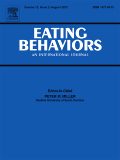
Eating Behaviors
Scope & Guideline
Bridging Clinical Psychology and Eating Behavior Research
Introduction
Aims and Scopes
- Eating Disorders and Psychopathology:
The journal publishes research on various eating disorders such as anorexia nervosa, bulimia nervosa, binge eating disorder, and related psychopathologies, exploring their prevalence, symptoms, and treatment approaches. - Psychological and Emotional Influences on Eating:
A significant focus is on how psychological factors, including stress, anxiety, and emotional regulation, influence eating behaviors and contribute to disordered eating patterns. - Cultural and Social Factors:
Research examining the impact of cultural, social, and familial influences on eating behaviors, including body image, peer dynamics, and media representations, is a critical area of exploration. - Nutrition and Health Outcomes:
The journal addresses the relationship between eating behaviors, dietary patterns, and health outcomes, including obesity, metabolic syndrome, and overall well-being. - Interventions and Preventative Strategies:
There is a strong emphasis on evaluating various interventions aimed at promoting healthy eating behaviors, preventing eating disorders, and improving treatment outcomes. - Developmental and Demographic Considerations:
The journal explores eating behaviors across different developmental stages and demographic groups, including children, adolescents, and diverse ethnic communities.
Trending and Emerging
- Impact of Social Media:
There is a growing body of research examining how social media platforms, including TikTok and Instagram, influence body image, eating behaviors, and the prevalence of eating disorders among diverse populations. - Intersectionality in Eating Disorders:
An emerging trend is the exploration of how intersecting identities, such as race, gender, and sexual orientation, affect the experience and manifestation of eating disorders. - Mindful and Intuitive Eating:
Increasing attention is being paid to mindful and intuitive eating practices as alternative approaches to traditional dieting, focusing on self-regulation and emotional awareness. - Food Insecurity and Eating Behaviors:
Research on the relationship between food insecurity and disordered eating behaviors is becoming more prominent, highlighting the socio-economic factors that influence eating patterns. - Adaptive and Maladaptive Coping Mechanisms:
The exploration of coping strategies related to stress and emotional regulation in the context of eating behaviors is trending, particularly among vulnerable populations.
Declining or Waning
- Traditional Dietary Practices:
Research on traditional or cultural dietary practices has seen a decline, possibly overshadowed by more contemporary issues such as the impact of social media on eating behaviors. - Purely Biological Approaches to Eating Disorders:
Studies focused solely on biological or genetic factors related to eating disorders are less frequently published, indicating a shift towards more integrative approaches that consider psychological and social dimensions. - Generalized Weight Loss Strategies:
There is a waning interest in generic weight loss strategies, with more emphasis now placed on nuanced and individualized approaches to eating behaviors and health. - Focus on Adult Populations:
Research targeting adult populations, particularly older adults, is decreasing, while there is a growing emphasis on adolescents and young adults, possibly due to the rising prevalence of eating disorders in these groups.
Similar Journals

BioPsychoSocial Medicine
Unlocking Potential: Comprehensive Research for Mental Health SolutionsBioPsychoSocial Medicine is a pioneering open-access journal published by BMC that has been at the forefront of integrating biological, psychological, and social perspectives in medicine since its inception in 2007. With a commitment to advancing research in the fields of biological psychiatry, psychology, and mental health, this journal has solidified its reputation, achieving notable ranking quartiles including Q2 in both Psychiatry and Mental Health, as well as Psychology categories as of 2023. Researchers and professionals can explore a wealth of interdisciplinary studies that bridge the gaps across these fields, facilitating a comprehensive understanding of mental health issues. As a vital resource for the academic community, BioPsychoSocial Medicine promotes innovative research that not only sheds light on complex psychological phenomena but also informs clinical practices and policies. The journal, indexed in Scopus, encourages knowledge sharing and collaboration, making it an indispensable platform for students, researchers, and practitioners alike in their pursuit of excellence in psychosocial medicine.

RBNE-Revista Brasileira de Nutricao Esportiva
Advancing Sports Nutrition for Every AthleteRBNE - Revista Brasileira de Nutrição Esportiva is a pivotal open-access journal dedicated to advancing the field of sports nutrition. Published by the Instituto Brasileiro de Pesquisa & Ensino Fisiologia Exercício (IBPEFEX) since 2007, RBNE aims to disseminate high-quality research that bridges the gap between nutritional science and athletic performance. With its commitment to accessibility and rigor, the journal provides a platform for researchers, practitioners, and students to share innovative findings and practical applications in sports nutrition. Although specific indexing metrics like H-Index and Scopus rankings are not currently listed, the journal's open access policy enhances its visibility and reach within the academic community, making it an essential resource for anyone involved in the intersection of nutrition and exercise science. The journal's work is vital in supporting athletes and fitness professionals in optimizing health and performance through informed nutritional strategies.
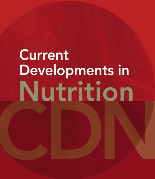
Current Developments in Nutrition
Advancing the frontiers of nutritional science.Current Developments in Nutrition is a prominent open-access journal published by Elsevier Science Inc, specializing in the field of nutritional science. With an ISSN of 2475-2991, this journal has been contributing valuable insights to the scientific community since its inception in 2017, and continues to shape research narratives through 2024. It boasts impressive rankings in the 2023 quartiles, achieving Q1 in Food Science and Q2 in both Medicine (miscellaneous) and Nutrition and Dietetics, highlighting its critical role in advancing knowledge in these areas. The journal is particularly noted for its commitment to disseminating cutting-edge research that influences dietary practices and public health policies. With Scopus rankings placing it in the 75th percentile in Medicine and the 68th percentile in Food Science, Current Developments in Nutrition serves as an essential resource for researchers, healthcare professionals, and students who seek to stay at the forefront of nutrition science. Its open-access model ensures that groundbreaking studies are available to a global audience, further enhancing collaboration and innovation across disciplines.
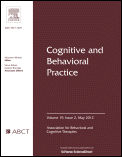
COGNITIVE AND BEHAVIORAL PRACTICE
Empowering practitioners with innovative cognitive strategies.COGNITIVE AND BEHAVIORAL PRACTICE, published by Elsevier Science Inc, is a prominent peer-reviewed journal focusing on the rapidly evolving field of clinical psychology. With an ISSN of 1077-7229 and an E-ISSN of 1878-187X, this journal has established itself as a key resource for researchers and practitioners alike since its inception in 1994. As of 2023, it proudly holds a Q1 ranking in the Clinical Psychology category, ranked #85 out of 311 according to Scopus, placing it in the 72nd percentile among its peers. The journal aims to disseminate innovative approaches and evidence-based practices within cognitive and behavioral therapy, encouraging robust discussion and dissemination of new findings to enhance clinical practices. Researchers and students engaged in psychological research will find the substantial rigor and depth in its publications invaluable for advancing their knowledge and skills.
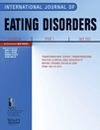
INTERNATIONAL JOURNAL OF EATING DISORDERS
Fostering innovation in psychiatry through dedicated eating disorder research.International Journal of Eating Disorders, published by Wiley, stands as a premier platform for disseminating high-quality research in the field of psychiatry and mental health, particularly focusing on eating disorders. With a respectable impact factor and ranking in the 91st percentile among its peers, this journal is recognized for its rigorous peer-review process and commitment to advancing understanding through empirical evidence. Established in 1981, it has continually evolved, maintaining its status as a Q1 journal in the Scopus category of Psychiatry and Mental Health. The Journal is committed to exploring the multifaceted nature of eating disorders, providing vital insights that support clinicians, researchers, and students alike in their pursuit of knowledge and innovation. Although access is not currently open, the journal offers a wealth of valuable resources for those engaged in cutting-edge research and clinical practice related to eating disorders.

NUTRITION AND HEALTH
Pioneering Discoveries in Nutrition and DieteticsNUTRITION AND HEALTH is a distinguished academic journal dedicated to advancing our understanding of the complex interplay between nutrition and health outcomes. Published by SAGE Publications Inc in the United Kingdom, this journal aims to provide a platform for rigorous research, innovative methodologies, and insightful reviews in the fields of nutrition and dietetics. With its ISSN 0260-1060 and E-ISSN 2047-945X, NUTRITION AND HEALTH has established itself as a critical resource for researchers and practitioners alike, boasting a 2023 Scopus ranking that places it in the Q3 quartile across multiple relevant categories, including Medicine and Nutrition and Dietetics. By facilitating open discourse on key issues such as dietary interventions, public health nutrition, and evidence-based practices, the journal significantly contributes to shaping health policies and improving nutritional guidelines. Although not an open-access journal, it remains a vital tool for those dedicated to enhancing human health through nutritional science. As we move into 2024, NUTRITION AND HEALTH continues to embrace multidisciplinary approaches, welcoming submissions that reflect the latest trends and findings in nutrition research.
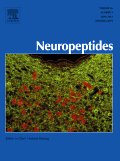
Neuropeptides
Fostering Collaboration in Cellular and Molecular NeuroscienceNeuropeptides is a prestigious, peer-reviewed journal published by Elsevier, focusing on the critical role of neuropeptides in various biological processes and their implications in cellular and molecular neuroscience, endocrinology, and neurology. With an impact factor reflecting its influence in the field and a diverse audience ranging from researchers to healthcare professionals, the journal serves as an essential platform for the dissemination of groundbreaking research from 1980 to 2024. Adhering to high academic standards, Neuropeptides holds a Q3 ranking in Cellular and Molecular Neuroscience and Endocrine and Autonomic Systems, alongside a solid Q2 ranking in both Endocrinology and Neurology. This positions the journal at the forefront of its disciplines, contributing valuable insights into the understanding of neuropeptide functions in health and disease. By not operating as an Open Access journal, it ensures sustainability in the publishing process while upholding rigorous review standards. Researchers, professionals, and students are encouraged to engage with the findings published in this journal, which plays a vital role in advancing knowledge and fostering collaboration within the neuroscientific community.

INTERNATIONAL JOURNAL OF PSYCHIATRY IN CLINICAL PRACTICE
Advancing mental health knowledge for a brighter future.INTERNATIONAL JOURNAL OF PSYCHIATRY IN CLINICAL PRACTICE is a distinguished publication in the field of Psychiatry and Mental Health, published by TAYLOR & FRANCIS LTD in the United Kingdom. With an impressive 2023 impact factor that places it in the Q2 category among its peers, this journal is an essential resource for researchers, clinicians, and students dedicated to advancing mental health practices and understanding psychiatric disorders. Covering topics from clinical studies to innovative treatment methodologies, the journal welcomes original research, reviews, and case studies that contribute valuable insights into clinical practice. Accessible without any open access restrictions, the journal has been a pivotal platform since its inception in 1997, facilitating knowledge exchange in the field up to 2024. As evidenced by its notable Scopus ranking within the top 73rd percentile of Psychiatry and Mental Health, it remains committed to impacting clinical practices significantly.

RBONE-Revista Brasileira de Obesidade Nutricao e Emagrecimento
Championing Evidence-Based Approaches to WellnessRBONE-Revista Brasileira de Obesidade Nutrição e Emagrecimento is a leading open access journal dedicated to advancing the study of obesity, nutrition, and weight management, published by the Instituto Brasileiro de Pesquisa & Ensino Fisiologia Exercício - IBPEFEX. Since its inception in 2007, the journal has fostered a collaborative environment for researchers, healthcare professionals, and students to share groundbreaking findings and innovative methodologies. Located in São Paulo, Brazil, RBONE aims to address the increasing public health concerns associated with obesity and to promote effective strategies for healthy living. With its commitment to high-quality peer-reviewed content, the journal not only contributes to the scientific community but also serves as an invaluable resource for practitioners seeking evidence-based approaches in nutrition and exercise science. With an ISSN of 1981-9919, RBONE stands as a cornerstone for those pursuing excellence in research and application within this vital field.
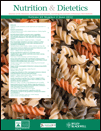
Nutrition & Dietetics
Empowering Professionals with Cutting-Edge Nutrition InsightsNutrition & Dietetics is a premier peer-reviewed journal published by WILEY that serves as a key resource for researchers, professionals, and students in the fields of nutrition, dietetics, and public health. With its ISSN 1446-6368 and E-ISSN 1747-0080, the journal focuses on disseminating high-quality research that addresses contemporary issues in food science, dietary practices, and nutritional health. Ranked in the Q2 category in both Nutrition and Dietetics and Public Health for the year 2023, it enjoys an impressive standing within its scientific community, reflected in Scopus ranks placing it in the top percentile of its categories. Although not an Open Access journal, readers can access a wealth of knowledge from studies converging from 2006 to 2024. The journal's commitment to advancing evidence-based practices makes it indispensable for those engaged in bridging the gap between nutrition science and practical application, while it continues to evolve alongside emerging research and global health trends.